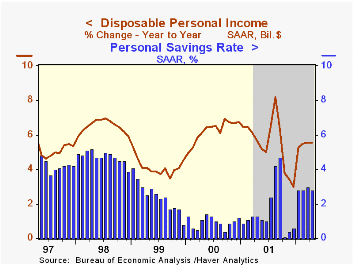 Global| May 28 2002
Global| May 28 2002Personal Income Up Moderately, Spending Slowed
by:Tom Moeller
|in:Economy in Brief
Summary
Personal income rose moderately, as expected, last month following an unrevised March. The rise in income was the weakest since December. Spending rose less than expected following a downwardly revised March. Wage and salary [...]

Personal income rose moderately, as expected, last month following an unrevised March. The rise in income was the weakest since December. Spending rose less than expected following a downwardly revised March.
Wage and salary disbursements rose a weak 0.1% (1.5% y/y) in April following a 0.2% gain the month earlier.
Personal spending rose modestly owing to a weaker than expected rise in durables spending. A 5.6% m/m surge in sales of light vehicles, to 17.4M units, had been expected to lift durables spending more than 1.4%. Spending on nondurables rose 0.8% and services spending rose 0.2%.
Disposable income rose 0.3% (5.6% y/y) in April following a 0.5% March gain.
The PCE price deflator rose 0.4% following an upwardly revised March. Less food and energy the price deflator rose 0.2% following three months of 0.1% gain.
| Disposition of Personal Income | April | Mar | Y/Y | 2001 | 2000 | 1999 |
|---|---|---|---|---|---|---|
| Personal Income | 0.3% | 0.4% | 2.8% | 4.9% | 7.0% | 4.7% |
| Personal Consumption | 0.5% | 0.3% | 4.3% | 5.0% | 7.7% | 6.7% |
| Savings Rate | 2.8% | 3.0% | 1.3% | 1.6% | 1.0% | 2.4% |
| PCE Price Deflator | 0.4% | 0.3% | 1.0% | 1.9% | 2.7% | 1.6% |
by Tom Moeller May 28, 2002

The Conference Board’s Index of Consumer Confidence rose in May, slightly less than expected. April's level was revised down slightly.
The 1.2% m/m rise in the Conference Board measure was slightly less than the moderate rise in the mid-month Sentiment measure from the University of Michigan.
The rise in confidence reflected a slight drop in consumer expectations but a moderate rise in the reading of the present situation.
The Conference Board's survey is conducted by a mailed questionnaire to 5,000 households and about 3,500 typically respond.
| Conference Board | April | Mar | Y/Y | 2001 | 2000 | 1999 |
|---|---|---|---|---|---|---|
| Consumer Confidence | 109.8 | 108.5 | -5.4% | 106.6 | 139.0 | 135.3 |
by Tom Moeller May 28, 2002

Sales of existing single family homes were strong last month, up 7.0% versus March which was revised up slightly. For the first four months of 2002 sales were up 9.3% from the 2001 average.
Home sales were up in each of the country’s four regions.
The median price of an existing home rose slightly to $153,300 (7.1% y/y).
The figures reflect closings of past sales.
The average rate on a conventional 30-year mortgage fell to 6.99% last month from 7.07% in December.
| Existing Home Sales (000, AR) | April | Mar | Y/Y | 2001 | 2000 | 1999 |
|---|---|---|---|---|---|---|
| Existing Single-Family | 5,790 | 5,410 | 9.5% | 5,291 | 5,159 | 5,193 |
Tom Moeller
AuthorMore in Author Profile »Prior to joining Haver Analytics in 2000, Mr. Moeller worked as the Economist at Chancellor Capital Management from 1985 to 1999. There, he developed comprehensive economic forecasts and interpreted economic data for equity and fixed income portfolio managers. Also at Chancellor, Mr. Moeller worked as an equity analyst and was responsible for researching and rating companies in the economically sensitive automobile and housing industries for investment in Chancellor’s equity portfolio. Prior to joining Chancellor, Mr. Moeller was an Economist at Citibank from 1979 to 1984. He also analyzed pricing behavior in the metals industry for the Council on Wage and Price Stability in Washington, D.C. In 1999, Mr. Moeller received the award for most accurate forecast from the Forecasters' Club of New York. From 1990 to 1992 he was President of the New York Association for Business Economists. Mr. Moeller earned an M.B.A. in Finance from Fordham University, where he graduated in 1987. He holds a Bachelor of Arts in Economics from George Washington University.
More Economy in Brief
 Global| Feb 05 2026
Global| Feb 05 2026Charts of the Week: Balanced Policy, Resilient Data and AI Narratives
by:Andrew Cates






